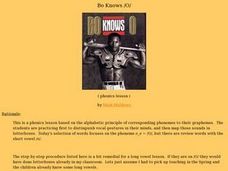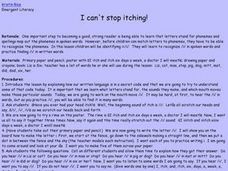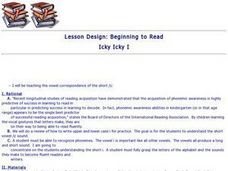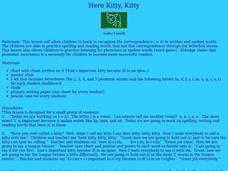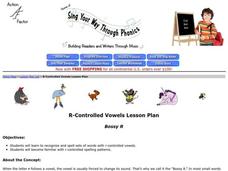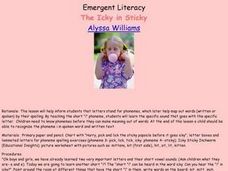Curated OER
Spotting Hidden Vowels
First graders recognize the short vowel i in written and spoken language. Through listening activities, they discriminate the vowel sound /i/ from other phonemes. Students associate the phoneme with its letter representation and identify...
Curated OER
Isabelle the Icky Iguana
Students practice the sound and spelling of the short vowel /i/. They identify the short /i/ sound in spoken and written words. The tongue twister "Isabelle iguana is in her igloo," and "Tin Man Fix It," along with Elkonin letter boxes...
Curated OER
Bo Knows "O"
Students are introduced to the vowel-consonant-e patter that changes short vowel sounds into long vowel sounds. They distinguish between the short vowel o and long vowel o. Students practice reading and spelling words with the...
Curated OER
Closed Syllables
Second graders, given 5 elephant words, divide the words into syllables by underlining the talking vowels, swooping, and pulling down consonants to find cutting pattern, and to explain that a single vowel represents the short vowel sound.
Curated OER
Oh My
Learners are introduced to the vowel-consonant-e patter that changes short vowel sounds into long vowel sounds. They distinguish between the short vowel sound for o and the long vowel sound for o. Students practice reading and spelling...
Curated OER
The Doctor Sound
Students recognize the short vowel o in written and spoken language. Through matching and listening activities, students discriminate the short vowel o from other short vowel sounds. They associate the phoneme with its letter...
Curated OER
I Can't Stop Itching
Students recognize the short vowel i in written and spoken language. Through matching and listening activities, they discriminate the vowel sound /i/ from other phonemes. After reading the story "Liz is Six," students draw a picture with...
Curated OER
Iiicky, Stiicky, I
First graders recognize the short vowel i in written and spoken language. Through listening and matching activities, they discriminate the vowel sound /i/ from other phonemes. Students identify the phoneme and letter in psuedo words they...
Curated OER
I Am Tired
First graders recognize the short vowel o in written and spoken language. Through listening and matching activities, they discriminate the vowel sound /o/ from other phonemes. Students associate the phoneme with its letter representation...
Curated OER
Icky Icky I
First graders review the letter "i" and use popsicle sticks and cotton balls to make upper and lower case "i's". Volunteers make the capital and lower case "i" on the board and then the class discovers the short sound that letter "i"...
Curated OER
Short Vowel Word Building
In this short vowel word building worksheet, students will choose a vowel from the letter bank to complete a 3-letter short vowel word.
Curated OER
Hi, My Name is A
Students distinguish between short vowel a and long vowel a. They are introduced to the vowel-consonant-e pattern that changes short vowel sounds into long vowel sounds. They practice decoding pseudo words with the vowel-consonant-e...
Curated OER
The Big Pig
Learners recognize the short vowel i in written and spoken language. Through matching activities, they discriminate the short vowel /i/ from other vowel sounds. Students associate the phoneme with its letter representation and identify...
Curated OER
Oh! Let's Go Home
Students distinguish between short vowel o and long vowel o. They are introduced to the vowel-consonant-e pattern that changes short vowel sounds into long vowel sounds. They practice reading and spelling words with the vowel-consonant-e...
Curated OER
Wade Swayed At the Masquerade
Students practice reading words with vowel patterns that change the sound of the vowel. After reviewing the short vowel sound /a/, they are introduced to the vowel-consonant-e pattern that changes the short vowel sound into a long vowel...
Curated OER
The Squeaky Door
Young readers distinguish between the sounds for short vowel e and long vowel e. They are introduced to the vowel patterns that comprise long vowel sounds, with emphasis on /ea/. They practice reading and spelling a variety of words that...
Curated OER
Here Kitty, Kitty
Learners recognize the short vowel i in written and spoken language. Through matching activities, they discriminate the short vowel /i/ from other vowel sounds. Students associate the phoneme with its letter representation and identify...
Curated OER
It's Time to Open Wide for O
Students recognize the short vowel o in written and spoken language. Through listening and decoding activities, they discriminate the vowel sound /o/ from other phonemes. Students match the phoneme and letter in words they read on index...
Curated OER
Sing Your Way Through Phonics Lesson Plan
Young scholars recognize and spell sets of words with r-controlled vowels. They become familiar with r-controlled spelling patterns.
Curated OER
The Icky in Sticky
Students study the /i/ sound by listening to it in words and a tongue twister which they later recite. Next, they practice writing the letter and making word using letterboxes. They listen to 'Icky Sticky Inchworm' while placing their...
Curated OER
Uh??? I Don't Know
Learners explore the short /u/ sound. They practice making the sound and use letterboxes to spell 'u' words. They recite tongue twisters and read with a partner, 'Fuzz and the Buzz.' They practice writing 'u' words and draw a circle...
Curated OER
Ouch! I have a booboo
First graders recognize the short vowel o in written and spoken language. Through matching activities, they discriminate the short vowel /u/ spelled ou from the short vowel /u/ spelled u. Students associate the phoneme with its letter...
Curated OER
Uhhh...Did I Do That?
Young scholars complete a variety of activities as they explore the letter u as it makes the short /u/ sound. They recite short /u/ tongue twisters and using Elkonin letter boxes, they spell words with the letter u. They also practice...
Curated OER
Uh...I Don't Know!!
Pupils explore the short /u/ sound. They practice making the sound, noticing how their mouths move to make the sound. They practice writing lower and uppercase U's. In pairs, they create and recite tongue twisters with short /u/ words.




